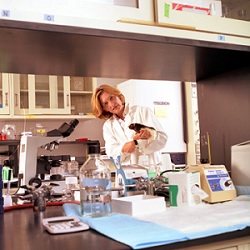 |
| AgeneBio founder Michela Gallagher |
A small biotech spinout from Johns Hopkins has published its data from a midstage study of a new Alzheimer's drug that it's planning to get into a late-stage study. And AgeneBio, founded by Johns Hopkins investigator Michela Gallagher, says the numbers back up its case that they may have something that works against the memory-robbing ailment--a story that the company hopes will deliver the support needed to pursue a Phase III study.
The drug is called AGB101, a low-dose version of the anti-epileptic drug levetiracetam. Gallagher has been working on the notion that at a fraction of its dose for epilepsy, levetiracetam can tamp down hippocampus overactivity in patients with amnestic mild cognitive impairment. Their data, published in NeuroImage: Clinical, includes results from tests that include patients' ability to remember images they're shown.
"The (Phase II) results show that AGB101 restored brain network function and significantly improved memory in elderly patients with aMCI," the company said in a statement today. "The Phase II trial was conducted by Johns Hopkins University and supported by a grant from the National Institutes of Health." Gallagher's lab specializes in researching neurocognitive aging, conducting animals as well as human studies.
According to its website, AgeneBio now plans to start a Phase III and wrap it toward the end of 2018. And the team faces some of the toughest odds on the drug development business. The failure rate in Alzheimer's, as everyone in this field knows too well, has been tracked above the 99% mark for the past decade. Dozens of failures have afflicted developers large and small. And Phase III studies aren't cheap.
AgeneBio has filed a series of Form Ds with the SEC on its fundraising activities. There was $400,000 noted February 6, part of a $900,000 raise. Last October the company noted that it had raised $4 million from a $10 million round.
"AgeneBio raised $7.5 million in 2014 and an additional $0.9m (so far) in 2015," a company spokesperson tells FierceBiotech in an email this morning. "Funding to date has come from the Alzheimer's Disease Discovery Foundation, the NIH, and high net worth individuals."
And there are plans to raise more.
"As an emerging company, fundraising is a constant activity," adds the spokesperson. "Yes, they are actively looking to secure the capital to execute the Phase III program through a pharma partnership, other sources of capital, or a combination of capital sources."
- here's the release
- here's the study data from Phase II